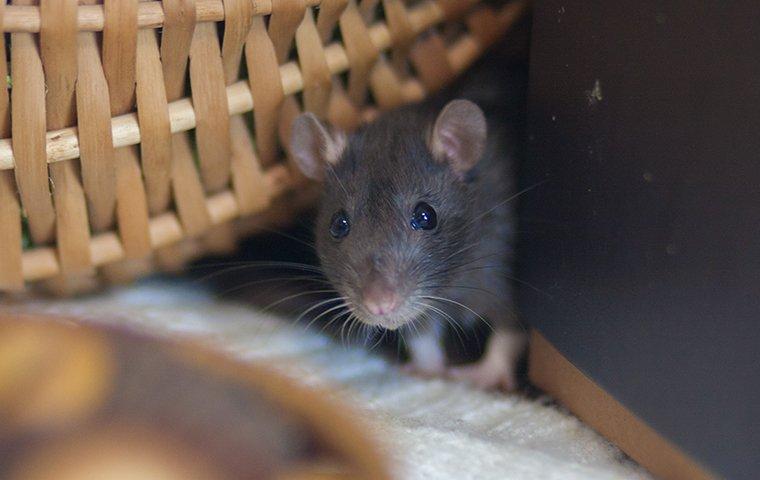
Dealing with rodents in your home can be a real headache. Those sneaky little critters can wreak havoc and cause all sorts of problems. If you're a homeowner in Hattiesburg, Mississippi, where rodents like mice and rats are all too common, it's essential to know how to keep them at bay. This comprehensive guide is here to help you navigate the world of rodent control and arm you with the knowledge and tips you need to protect your home and loved ones.
From understanding what exactly rodents are and the havoc they can wreak on your property, to learning simple yet effective techniques to keep them out, we've got you covered. We'll also discuss the health risks associated with rodent infestations because, let's face it, nobody wants those disease-carrying pests running around their house. And if you're wondering when it's time to call in the pros, we'll tackle that too.
So, get ready to kick those rodents to the curb and create a rodent-free sanctuary in your Hattiesburg home. For rodent pest control in Hattiesburg, look no further than our team at Havard Pest Control. Let's dive in and take control!
What Are Rodents?
Rodents are a diverse group of mammals that belong to the order Rodentia. They are known for their unique characteristic of continuously growing incisors, which sets them apart from other mammals. This specialized dental adaptation allows them to gnaw and chew on various materials, including wood, wires, and food.
Rodents come in various shapes, sizes, and habitats, making them one of the most successful mammalian groups on Earth. There are many different types of rodents, including mice, rats, squirrels, chipmunks, beavers, and guinea pigs. While some rodents are kept as pets, many others are considered pests when they invade our homes.
These small mammals have remarkable adaptability and can be found in diverse environments worldwide. From urban areas to forests, deserts to grasslands, rodents have managed to colonize nearly every corner of the globe. They possess impressive reproductive capabilities, with short gestation periods and large litters, which contribute to their population growth and survival.
Rodents play essential ecological roles as seed dispersers, predators, and prey in various ecosystems. However, when they find their way into our homes, they can cause significant problems and damage. Their gnawing behavior can lead to structural damage, electrical malfunctions, and even fire hazards when they chew on wires. Additionally, rodents can contaminate food, spread diseases, and trigger allergies through their droppings and urine.
Understanding the characteristics and behaviors of rodents is crucial for effective rodent control. By knowing their habits, entry points, and the potential damage they can cause, homeowners in Hattiesburg can implement preventive measures and take proactive steps to keep their homes rodent-free.
In Hattiesburg, Mississippi, rodents are a common nuisance for homeowners. The warm climate and abundant food sources in the area make it an attractive habitat for rodents to thrive. The two most common rodents in Hattiesburg are mice and rats.
Mice, particularly house mice, are small rodents that can fit through tiny openings and quickly establish themselves in homes. They are excellent climbers and can access upper floors and attics through wall voids, pipes, or gaps in the structure. Mice are prolific breeders, with a single female capable of producing several litters per year, each with multiple offspring. These adaptable creatures are known for their ability to find food and water sources in residential areas, making them a common sight in kitchens, pantries, and storage areas.
Rats, specifically Norway rats and roof rats, are also prevalent in Hattiesburg. Norway rats are larger and tend to burrow in the ground, while roof rats are agile climbers that prefer to nest in higher areas, such as attics, trees, and rooftops. Rats are capable of causing significant damage to buildings by gnawing through materials like wood, plastic, and even concrete. They are also carriers of various diseases and can contaminate food and water supplies.
Rodents in Hattiesburg seek shelter, food, and water sources within homes and buildings. They can enter through small cracks, gaps in foundations, damaged vents, and openings around utility lines. Once inside, they can quickly multiply and establish nesting sites in secluded areas like wall voids, attics, basements, or crawl spaces.
To effectively control rodent infestations in Hattiesburg, homeowners should be vigilant in identifying and sealing entry points, implementing proper sanitation practices, and employing effective trapping and exclusion techniques. Seeking professional assistance from pest control experts who are familiar with local rodent behaviors and effective control methods can also be beneficial for long-term prevention and eradication.
Rodent Infestations Are A Major Health Risk
Rodent infestations pose significant health risks to homeowners and their families. These pests can transmit a range of diseases, directly or indirectly, through their droppings, urine, bites, or parasites they carry. In Hattiesburg and other areas, it is essential to be aware of the potential health hazards associated with rodent infestations.
- Disease Transmission: Rodents are known carriers of numerous diseases that can be transmitted to humans. Some of the most common diseases include:
- Hantavirus: Found in rodent droppings, particularly from deer mice, hantavirus can cause Hantavirus Pulmonary Syndrome (HPS), a potentially life-threatening respiratory illness.
- Salmonellosis: Rodents can carry Salmonella bacteria, which can contaminate food and cause symptoms like diarrhea, abdominal pain, and fever.
- Leptospirosis: This bacterial infection is commonly spread through contact with rodent urine or water contaminated with urine. It can lead to flu-like symptoms, liver and kidney damage, and in severe cases, organ failure.
- Rat-Bite Fever: As the name suggests, this disease is transmitted through bites or scratches from infected rodents. It can cause fever, joint pain, rash, and potentially serious complications if left untreated.
- Allergies and Asthma: Rodent droppings, urine, and dander can trigger allergic reactions and exacerbate asthma symptoms, especially in individuals who are already prone to these conditions. The presence of rodent allergens in indoor environments can lead to respiratory distress, coughing, sneezing, and skin irritations.
- Contamination of Food and Water: Rodents contaminate food and water supplies through their droppings, urine, and hair. Consuming contaminated food or water can result in gastrointestinal illnesses and other health issues. They can also chew through food packaging, rendering it unsanitary and potentially causing foodborne illnesses.
- Structural Damage and Fire Hazards: Rodents have strong teeth that continuously grow, leading them to gnaw on various materials. In homes, they can cause damage to electrical wiring, insulation, pipes, and structural components. Chewed electrical wires pose a fire hazard, potentially resulting in costly damage or endangering occupants.
To mitigate the health risks associated with rodent infestations, homeowners should promptly address and eradicate any signs of rodent activity. Implementing effective control measures, such as proper sanitation practices, sealing entry points, and employing trapping or baiting techniques, can help prevent and eliminate rodent infestations. Seeking professional assistance from pest control experts is advisable to ensure thorough and safe eradication, particularly in cases of severe infestations.
Four Simple Yet Effective Rodent Exclusion Tips
Implementing effective exclusion techniques is crucial in preventing rodents from entering your home. Here are four simple yet effective tips for rodent exclusion:
Seal Entry Points
- Conduct a thorough inspection of your home, paying attention to potential entry points for rodents. These include gaps around windows and doors, cracks in the foundation, openings around utility lines, and damaged vents.
- Use appropriate materials such as caulk, steel wool, or wire mesh to seal these entry points. Fill in cracks and gaps, ensuring a tight seal that rodents cannot easily penetrate.
- Pay extra attention to areas where pipes and wires enter your home, as rodents can squeeze through surprisingly small spaces.
Eliminate Food Sources
- Rodents are attracted to readily available food sources. Keep your kitchen and pantry clean and organized.
- Store food in airtight containers, as rodents can easily chew through cardboard, plastic, and thin packaging.
- Clean up food spills and crumbs promptly, particularly in areas where you prepare and consume food.
- Properly dispose of trash in secure bins with tightly fitting lids. Regularly clean your outdoor garbage area to prevent attracting rodents.
Maintain Proper Sanitation
- Rodents seek shelter in areas with clutter and debris. Keep your home clean and clutter-free to discourage them from nesting.
- Trim vegetation, especially near the perimeter of your home. Overhanging tree branches or dense shrubbery can provide easy access for rodents to your roof or attic.
- Regularly clean and organize storage areas, basements, and crawl spaces to eliminate potential hiding spots for rodents.
Install Door Sweeps and Weatherstripping
- Install door sweeps on exterior doors to close the gap between the door and the threshold. This prevents rodents from squeezing through small openings.
- Use weatherstripping to seal gaps around windows and doors, ensuring a tight seal that prevents rodent entry.
- Check existing door sweeps and weatherstripping regularly for any signs of wear or damage. Replace them if necessary to maintain their effectiveness.
By following these simple exclusion tips, you can significantly reduce the likelihood of rodents entering your home. Remember that rodents can be persistent, so it's important to be thorough in your efforts and regularly inspect and maintain the integrity of your home's defenses against them.
The Pros To Know For The Best Rodent Control For Your Home
When it comes to getting rid of those pesky rodents in your home, you need the pros who know what they're doing. That's where Havard Pest Control comes in. We've been in the business for over 70 years, proudly serving Alabama, Louisiana, and Mississippi.
At Havard Pest Control, we're all about top-notch service and effective pest control. We've built our reputation on honest evaluations, quality products, and unbeatable customer service. Our team of highly trained technicians has the experience and know-how to tackle your rodent problem head-on. With 12 office locations, we've got you covered across the region. We understand the unique challenges homeowners in Hattiesburg face when it comes to dealing with rodents. That's why we're committed to providing the best home pest control solutions tailored to your needs.
We're not just here to eliminate your current rodent problem. We're all about long-term control and rodent prevention. Our experts will assess your situation, offer personalized strategies, and ensure those rodents stay far away from your home for good. Don't let rodents take over your living space and jeopardize your well-being. Reach out to Havard Pest Control today, and let our friendly and experienced team take care of your rodent control needs.
Say goodbye to intruders and finally get rid of rodents for good. Trust us, with Havard Pest Control, you're in good hands!


 Reviews
Reviews





